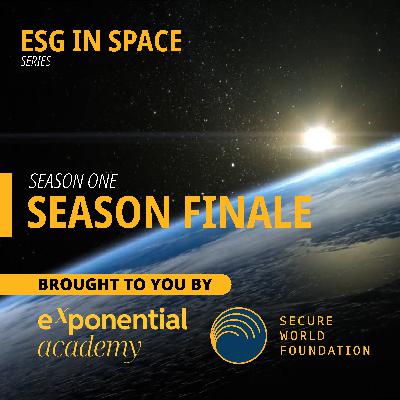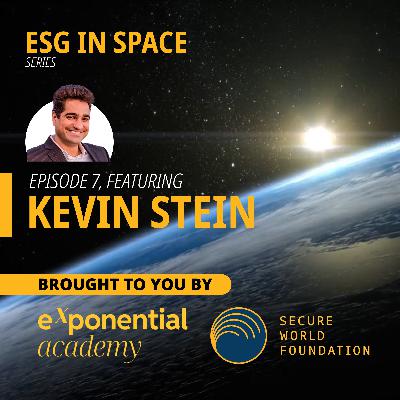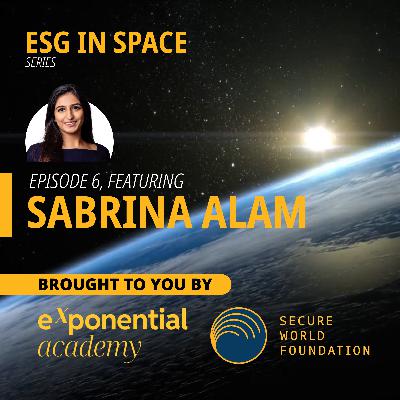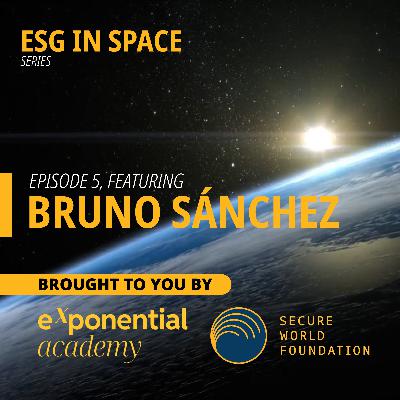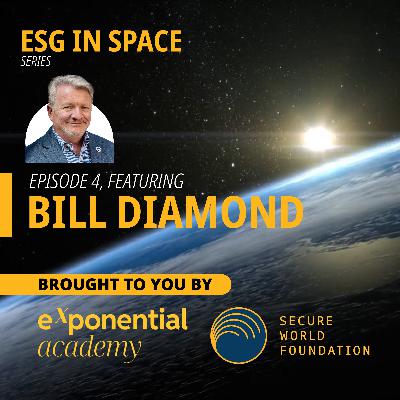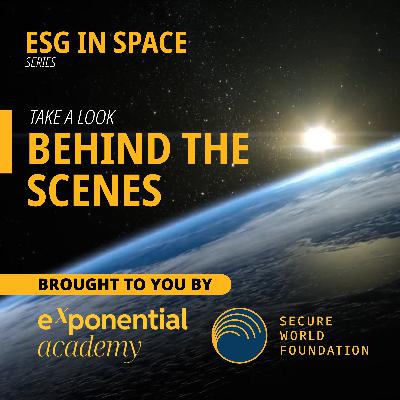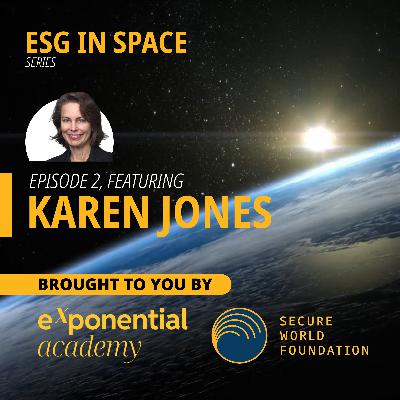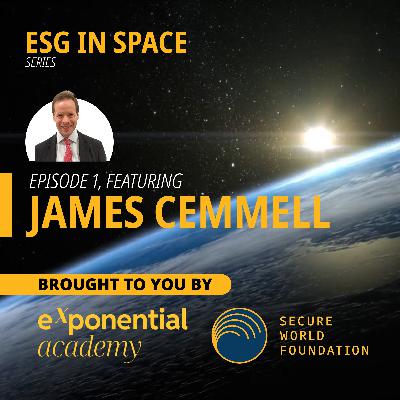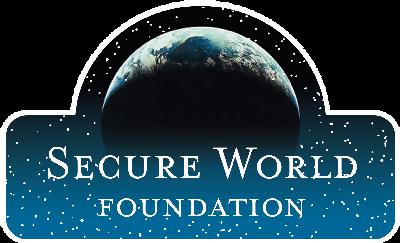Discover The Secure World Foundation Podcast
The Secure World Foundation Podcast

The Secure World Foundation Podcast
Author: Secure World Foundation
Subscribed: 28Played: 235Subscribe
Share
Description
This podcast features content produced by the Secure World Foundation (SWF), an endowed, private operating foundation that promotes cooperative solutions for space sustainability and the peaceful uses of outer space. The Foundation acts as a research body, convener and facilitator to promote key space security, and other related topics, and to examine their influence on governance and international development.
76 Episodes
Reverse
That's a wrap on this season of ESG in Space! Across eight episodes, we've looked into how sustainability, governance, and innovation shape the evolving space economy. So, what's changed? Quite a bit. And what matters now more than ever? In this season wrap-up, Ian Christensen joins hosts Miki Sode and Nishan Degnarain to reflect on the insights, shifts, and standout moments from the journey so far. "Maybe we don't talk as much about ESG as a lens, but some of the driving considerations behind that, like coordination, risk management, and trust, are still really relevant." — Ian Christensen, Secure World Foundation Recorded June 2, 2025
"A Singaporean Vision for Space Sustainability" featuring Jonathan Hung, Head of Singapore's National Space Office The Secure World Foundation (SWF) and Exponential Academy are proud to present Episode 8 of the "ESG in Space" podcast series, spotlighting an insightful conversation with Jonathan Hung, Head of the Office for Space Technology and Industry (OSTIn)—Singapore's National Space Office. In this episode, Jonathan shares Singapore's evolving journey in the space domain—from the establishment of its first satellite ground station in 1971 to launching its national space office in 2013. Singapore's approach to space development is defined by a keen focus on sustainable economic growth, global connectivity, and technological innovation across key adjacent industries such as aerospace, finance, and maritime sectors. As a small but highly strategic nation, Singapore has committed to enabling a pro-business, collaborative space environment, serving as both a regional hub and a global bridge for space activity. Jonathan explains how the city-state leverages public-private partnerships to attract foreign and domestic companies alike, positioning Singapore as a launchpad for startups and established players targeting the Asia-Pacific market and beyond. The conversation also explores Singapore's core values in space governance: commitment to international norms, peaceful use of space, and support for inclusive and rules-based cooperation. Singapore is actively engaged in multilateral platforms, such as COPUOS and the Artemis Accords, and recently co-hosted workshops with SWF to promote long-term sustainability and space traffic management across the ASEAN region. Jonathan also discusses OSTIn's Earth Observation initiative and investments in quantum communications, highlighting Singapore's focus on real-world space applications in climate monitoring, financial security, and secure data exchange. Finally, the episode underscores Singapore's drive to cultivate space talent from the ground up—engaging students, researchers, and innovators in a holistic vision for a sustainable and diverse global space economy. Tune in to discover how Singapore is crafting a purpose-driven space agenda that blends technology, policy, and entrepreneurship to ensure a resilient and inclusive future among the stars. Recorded May 2, 2025
From Space to the Last Mile: Turning Satellite Data into Climate Resilience with Kevin Stein In Episode 8 of ESG in Space, hosts Nishan Degnarain and Miki Sode are joined by Kevin Stein, CEO and co-founder of Delos, a wildfire-focused insurance company powered by satellite data. Drawing on his background in aerospace engineering and spacecraft design, Kevin shares how his team pivoted from space hardware development to creating practical insurance solutions that directly address the growing risk of climate-induced wildfires in California. This conversation looks into how space-based Earth observation can be operationalized into tangible products for high-risk communities, and what it takes to bridge the gap between the space sector and everyday users. Kevin also discusses why diversified data streams and cross-sector communication are critical to building resilience in both space and ground industries. Recorded April 2025
Designing Sustainability Into the Space Sector: Insights from Europe In Episode 7 of ESG in Space, hosts Nishan Degnarain and Miki Sode sit down with sustainability strategist Sabrina Alam, whose cross-sector work spans theoretical physics, government policy, and commercial space. Currently at KPMG Luxembourg, Sabrina shares a deep dive into how Europe is embedding ESG principles into its space infrastructure, from satellite design to lifecycle assessments and regulatory policy. This episode explores Europe's proactive stance on sustainability by design, the impact of mandatory ESG reporting frameworks like CSRD, and how these policies are reshaping both public and private actors across the space value chain. Sabrina also discusses how European operators balance innovation and competitiveness with sustainability mandates, and how these approaches could influence global norms. If you're curious about the intersection of sustainability, policy, and economic resilience in the space sector, especially through a European lens, this episode is essential listening. Recorded March 2025
Harnessing Satellite Data and AI for Global Impact with Bruno Sánchez-Andrade Nuño Secure World Foundation is pleased to announce the fifth episode of ESG in Space, a podcast series in collaboration with Exponential Academy, hosted by Nishan Degnarain and Miki Sode. This conversation features Bruno Sánchez-Andrade Nuño, Executive Director and Founder of Clay. In this episode, Bruno shares how open data, satellite imagery, and artificial intelligence can work together to power social good. He walks through the mission behind Clay, a nonprofit platform that uses AI to make Earth observation data more accessible and actionable. The conversation explores everything from carbon monitoring and disaster response to the ethics of data sourcing and the future governance of AI tools in space applications. Listen to ESG in Space Episode 5 here or on our YouTube Channel to discover how transparency, equity, and innovation are reshaping the role of space-based technologies for global sustainability. Recorded October 7, 2024
Exploring Life Beyond Earth and the Role of Inclusive Governance with Bill Diamond Secure World Foundation is pleased to announce the release of the fourth episode of ESG in Space, a podcast series in collaboration with Exponential Academy, hosted by Nishan Degnarain and Miki Sode. This episode features a wide-ranging conversation with Bill Diamond, President and CEO of the SETI Institute. In this episode, Bill shares his perspective on the evolving space economy, the importance of scientific research in astrobiology, and how space-based platforms support our understanding of life on Earth. He also addresses the need for inclusive governance frameworks in space exploration—highlighting lessons from Earth-based examples like Antarctica and emphasizing the importance of engaging underrepresented voices in the future of space policy. Listen to ESG in Space Episode 4 here or on our YouTube Channel for an exploration of how science, sustainability, and equity intersect in our journey beyond Earth. Recorded December 18, 2024
Exploring NASA, SpaceX, and the Evolution of Space Ventures with Abhi Tripathi Secure World Foundation is thrilled to announce the release of the fifth episode of "ESG in Space," a podcast series in collaboration with Exponential Academy, hosted by Nishan Degnarain and Miki Sode. This episode features a fascinating discussion with Abhi Tripathi, Director of Mission Operations at UC Berkeley's Space Sciences Lab. In this episode, Abhi discusses his journey through the space sector, from his early days at NASA to key roles at SpaceX, and now leading mission operations at UC Berkeley. He shares his unique insights on the transition of space activities from government-dominated initiatives to vibrant commercial enterprises and discusses the critical role of government and military funding in nurturing the nascent commercial space industry. Listen to "ESG in Space" Episode 3 here or on our YouTube Channel to gain a deeper understanding of the complexities and potential of commercial space ventures. Recorded January 29, 2025
Behind the Scenes of ESG in Space: The Making of a Space Sustainability Podcast Take a trip with us into the backstory of the "ESG in Space" podcast series in this exclusive behind-the-scenes episode. Hosted by Nishan Degnarain and Miki Sode, this unique session features insights from Ian Christensen of Secure World Foundation, one of the key sponsors and collaborators in the series. This conversation sheds light on the motivations, challenges, and aspirations behind creating a podcast dedicated to exploring Environmental, Social, and Governance (ESG) issues in the space sector. Discover how the series aims to foster dialogue on space sustainability, the intersection of the space economy with societal benefits, and the roles different stakeholders play in shaping this narrative. From discussions about space debris management to responsible actions within the space economy, this episode offers a candid look at the thoughts and processes that drive the content of "ESG in Space."
Navigating the Expanding Universe of the Space Economy with Karen Jones Join us for the second episode of "ESG in Space," hosted by Nishan Degnarain and Miki Sode in partnership with Exponential Academy. This episode features Karen L. Jones, a senior project leader and space economist at The Aerospace Corporation, who brings deep insights into the evolving space economy. Karen discusses the critical role of satellite technology in supporting various industries—from telecommunications to environmental monitoring—and its convergence with future technological advancements like 6G networks. In this conversation, Karen explores the complexities of space economy integration, emphasizing the importance of sustainable practices as the number of satellites rapidly increases. She addresses the challenges of space debris management and the need for regulatory coherence to ensure safe and sustainable space operations. Tune in to learn how space technology is not just about reaching new heights but also about grounding these advancements in sustainable practices that can support Earth's environmental and technological ecosystems. Recorded Dec 6, 2024
Welcome to "ESG in Space," a groundbreaking series brought to you by the Secure World Foundation and Exponential Academy. In this inaugural episode, join hosts Nishan Deeran and Mickey S.H. as they engage with James Cemmell, a seasoned space industry expert with a 17-year tenure shaping the sector's landscape. James explores the transformation of space from a government-dominated realm to a vibrant arena of private innovation and discusses the vital role of satellites in societal advancements across the globe. With insights spanning from orbital mechanics to international collaborations, this episode offers a deep dive into the mechanisms that ensure space remains a sustainable and accessible frontier for future generations. Tune in to explore how environmental, social, and governance factors intersect in the ever-evolving expanse of space. Recorded October 7, 2024
Episode 4's guest is Nishan Degnarain, the CEO of EXO Solutions and Former Chair, World Economic Forum Global Agenda Council on Oceans. In this conversation with Nishan, recorded on December 2nd, 2022, themes discussed include sustainability in comparison between the ocean and space domains, development of effective ESG strategies in new investment sectors; and the opportunities for growth in sustainable space activities.
Episode 2's guest is Matthew Kuta, the Co-Founder, President, and Chief Operating Officer of Voyager Space Holdings. In this conversation with Matt, recorded on October 4th 2022, themes discussed include the increasing importance of ESG requirements for large investment capital sources; the possible role of ESG factors as a discriminator between companies in private equity investment decisions; and the challenges and outlooks for developing ESG practices and reporting for NewSpace companies.
Episode 2's guest is Matt O'Connell, Operating Partner at DCVC. In this conversation with Matt, recorded on August 26th, 2022, themes discussed include the links between sustainable operating practices in space and sustainable business results; the challenges of large constellations, and the need for improving information sharing as commercial space activities expand. The discussion also covers both the benefits and downsides of ESG motivations in the space sector.
Episode 1's guest is Mark Boggett, CEO and Managing Partner of Seraphim. In this conversation with Mark, recorded on August 1st 2022, themes discussed include the contribution of ESG factors in driving investment activity; the ways in which venture capital funds can interact with portfolio companies to address sustainability; and the role of the UN Sustainable Development Goals for tracking investment outcomes.
What are the most pressing challenges confronting governments, industry and civil society in terms of building capacity for implementing international space sustainability guidelines, and what steps should each of these three sectors prioritize to build such capacity? This panel of leading international experts shared their thoughts on how governments, industry and civil society can jointly build capacity in the space community to support the implementation of the international guidelines for space sustainability recently adopted by the UN. For more background information on these guidelines, see our SWF Factsheet. Panelists Government Niklas Hedman, UN Office for Outer Space Affairs, Austria Andre Rypl, Ministry of Foreign Affairs, Brazil Keren Shahar, Ministry of Foreign Affairs, Israel David Turner, Department of State, United States Industry Aarti Holla-Maini, EMEA Satellite Operators Association, Belgium Therese Jones, Satellite Industry Association, United States Daniel Oltrogge, Space Safety Coalition, United States Charity Weeden, Astroscale, United States Civil Society David Kendall, Outer Space Institute, Canada Jean-Jacques Tortora, European Space Policy Institute, Austria Guoyu Wang, Beijing Institute of Technology, China Danielle Wood, Massachusetts Institute of Technology, United States
Secure World Foundation and the ISS National Labs co-hosted the first in a two-event series, one in the San Francisco Bay area and one in Washington, DC. This series is designed to highlight and examine the socioeconomic benefits of the International Space Station. Global efforts like the Sustainable Development Goals are benefiting from work being done on ISS but these activities have received little attention. Speakers comprised a diverse group of ISS National Lab partners, data end-users, and government representatives who spoke to unique work that's being done, the observed or expected benefit on Earth, and the importance of maintaining the space environment to support this work.
Many earth scientists unknowingly use special allocations of spectrum that are reserved for the collection and transmission of hydrometeorological data, particularly involving weather satellites. These allocations, for example, provide rebroadcasts of geostationary weather satellite imagery, transmit National Oceanic and Atmospheric Administration (NOAA) data to academic and industry partners, and enable passive microwave sensing of weather systems over the ocean. Data received through these allocations are paramount to achieving the best possible timeliness and quality of weather forecasts and warnings. Satellite observations of Earth's atmosphere are a major contributor to weather and climate research, and improve the predictions from numerical weather prediction models. However, the spectrum allocations for meteorological observations and earth exploration is potentially becoming threatened from proposals to deploy 5G and other advanced networks in adjacent bands, introducing risk and uncertainty for longstanding remote sensing applications. Because scientists and other users of weather data do not typically follow the complex and technical government spectrum proceedings, there is limited advocacy from those who could be impacted most and could best convey the true value of certain spectrum allocations for science. In order to illustrate the wide range of potential impacts to weather satellite observations and timely earth science data transmissions, this panel, at the 2019 Joint Satellite Conference, discussed various spectrum proposals and how they might impact earth science research and users of earth-observing satellite imagery and products. The panel will also explain the regulatory environment and challenges to a brokered discussion on the relative merits of competing needs for spectrum allocations. It was an opportunity to share information with an international audience of satellite experts across government, academic and private sector audiences. The timing occurred shortly after the close in public comments to the FCC on the NPRM related to GOES real time data access (1675-1680 MHz) and just prior to the start of the World Radio Conference where discussions will include the rules around the global deployment of 5G technologies, including spectrum resources closely adjoining passive remote sensing observations for numerical weather prediction (especially near 23.8 GHz). Speakers: Jordan Gerth, Physical Scientist, National Weather Service Office of Observations Ryan Terry, Director, Regulatory Licensing and Policy, Lockheed Martin Corporation Elliot Eichen, 2018-2019 IEEE-USA Congressional Fellow, and former Director of R&D, Verizon Communications Dave Lubar, Senior Project Leader, Civil Spectrum Management, Civil Systems Group, The Aerospace Corporation Session Co-chairs: Renee Leduc, Founder & Principal, Narayan Strategy Krystal Wilson, Director of Space Applications Programs, Secure World Foundation More details, can be found at the event page on the SWF website.
Recorded in Washington, DC on September 26, 2019. Since 2016, Secure World Foundation (SWF) has partnered with the U.S. Department of State to host multiple Space Weather as a Global Challenge events to facilitate discussions on the impacts of space weather across the globe, and plans to collaborate in observation, modeling, prediction, and mitigation of harmful effects. This year's Space Weather as a Global Challenge will be held in coordination with the Next Step Benchmarks Town Hall, an event that supports the U.S. National Space Weather Strategy and Action Plan, on September 26, 2019. The Next Step Benchmarks is an effort funded by NSF and NASA, and led by the IDA Science and Technology Policy Institute (STPI), that has gathered 32 of the world's leading space weather scientists to develop recommendations for improving the characterization of extreme space weather events. Initial characterizations of 1-in-100-year and theoretical maximum events for five space weather phenomena were described in the Space Weather Phase 1 Benchmarks report, released by the White House's National Science and Technology Council in 2018. The Next Step Benchmarks team is developing a public report that will provide recommendations to improve the estimates found in the Phase 1 report. The Town Hall will be an opportunity for the space weather community to provide feedback on proposed recommendations and priorities for studies, data acquisition, and long-term research that would improve the characterization of extreme space weather events. Following the Town Hall, SWF and the U.S. Department of State hosted an evening panel discussion and networking reception to share the general outcomes of the Town Hall and other U.S. and international space weather initiatives. Speakers Jean-Luc Bald, First Secretary, Space Global Issues & Innovation Section, Delegation of the European Union to the United States of America Mark Harvey, Special Assistant to the President and Senior Director for Resilience Policy, National Security Council Staff Jeff O'Neil, Legislative Director, Office of Congressman Ed Perlmutter (CO-07) Geoffrey Reeves, Research Fellow, Los Alamos National Lab Moderator: Josh Wolny, Project Manager, Secure World Foundation More details, including transcripts, can be found at the event page on the SWF website.
The growth in space activities has shifted space traffic management from an academic debate to real-world policy debate, yet there is still significant uncertainty about what it means and how to go about creating a workable regime. Should space traffic management be top-down with a global agreement on rules and standards? Or should it be done from the bottom-up with industry practices enshrined in national regulation? Who decides what the rules are, who they apply to, and how they are enforced? | Moderator: Chris Johnson, SWF Space Law Advisor Panelists: Didier Alary, University of Toulouse Talal Al Kaissi, UAE Space Agency Ron Lopez, Astroscale U.S. Jennifer Warren, Lockheed Martin
Over the last several years, there has been a growing focus on two different conversations: one about the commercial and economic development of space, and another about the risk of conflict on Earth extending into space. Yet there is often very little dialogue on how these two issues interact and what impact each may have on the other. How might greater geopolitical instability or actual war in space impact commercialization? Can the private sector play a role in deterring space conflict or providing more resilient capabilities? | Moderator: Brian Weeden, SWF Director of Program Planning Panelists: Joshua Huminski, Center for the Study of the Presidency & Congress Pam Melroy, Melroy & Hollett Technology Partners Bhavya Lal, Science and Technology Policy Institute Doug Loverro, Loverro Consulting Jeffrey Trauberman, VOX Space This audio was recorded June 25th at the National Press Club in Washington, DC as part of the Secure World Foundation's Summit for Space Sustainability.


